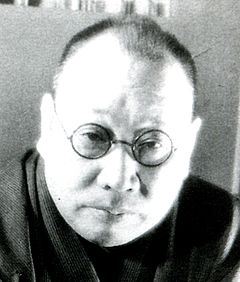- Mantarō Kubota
-
Mantarō Kubota 
Kubota MantarōBorn 11 November 1889
Tokyo, JapanDied 6 May 1963 (aged 73)
Tokyo, JapanOccupation Writer, playwright and poet Genres novels, stage plays, haiku
Influences- Kume Masao, Ryūnosuke Akutagawa
Mantarō Kubota (久保田 万太郎 Kubota Mantarō, 11 November 1889 - 6 May 1963) was a Japanese author, playwright, and poet.
Contents
Biography
Kubota was born in the Asakusa district of Tokyo, to a clothing merchant family. He became interested in stage plays at an early age, largely through the influence of his grandmother, who also provided financial support for him to attend college. While still a student at Keio University in 1911, he made his literary debut with the short novel Asagao ("Morning Glory", 朝顔) and a stage play Yugi ("Game", 末枯), both of which appeared in the university's journal. Starting from 1919, Kubota taught courses in literature at Keio University.
Kubota went on to write many full-length novels, including Tsuyushiba ("Dew on the Grass"), and Shundei ("Spring Thaw"), which depicted the joys and sorrows and traditional lifestyle of ordinary people in working-class neighborhoods in old pre-war Tokyo.
In the Great Kantō Earthquake of 1923, his home in the Nippori district of Tokyo burned down, and he relocated to nearby Tabuchi, where he made the acquaintance of Ryūnosuke Akutagawa.
In 1926, along with the novelist Masao Kume, he joined the Tokyo Central Broadcasting Station (now NHK), and later headed the drama and music department. He greatly contributed to the development of radio broadcast drama in its early stages.
In 1937, together with Kunio Kishida and Toyoo Iwata, Kubota created the Bungakuza theater company and became a leading figure in the modern theater circles in Japan.
Kubota lived in Kamakura, Kanagawa Prefecture from 1945-1955. He first moved there when an air raid destroyed his Tokyo home. During those ten years, he made the acquaintance with many of the Kamakura literati as chairman of the Kamakura P.E.N. Club.
In the field of haiku poetry, Kubota came to edit the haiku magazine, Shunto. Although haiku remained merely a hobby, as he was more interested in novels and plays, Kubota published several haiku collections.
Kubota died on 6 May 1963 at the age of 73, of food poisoning, after eating an akagai clam at a party held by Ryuzaburo Umehara.
See also
- Japanese literature
- List of Japanese authors
External links
.
Haiku of Kubota Mantaro
References
- Powell, Brian. Japan's Modern Theater. RoutledgeCurzon (2002). ISBN 1873410301
Categories:- 1889 births
- 1963 deaths
- People from Tokyo
- Japanese poets
- Japanese screenwriters
- Japanese dramatists and playwrights
Wikimedia Foundation. 2010.
